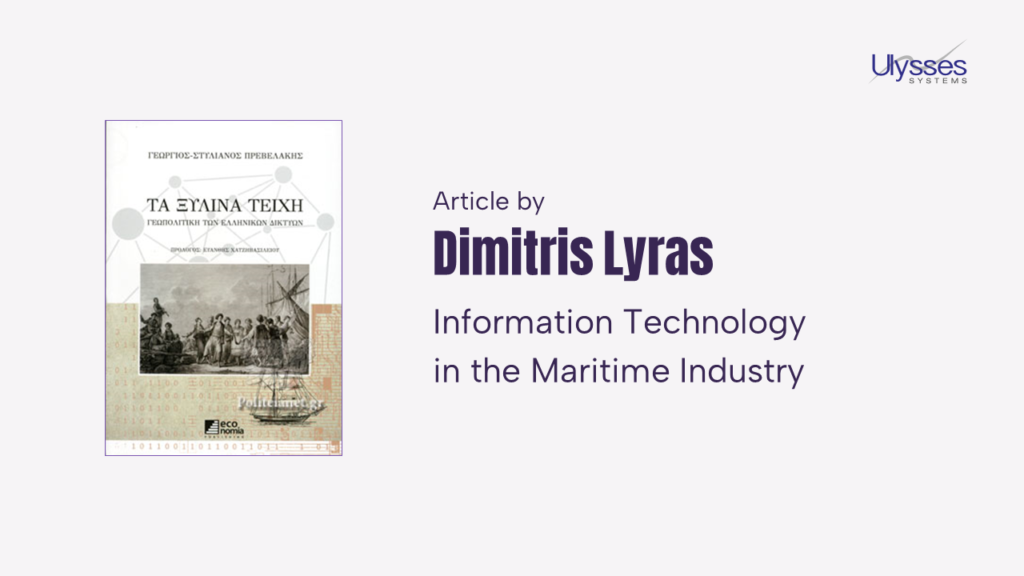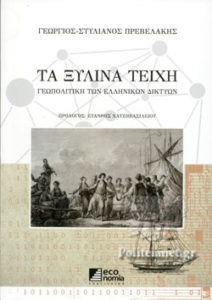
Information Technology in the Maritime Industry
«Information Technology in the Maritime Industry» is an article by Dimitris Lyras. The author comments on Professor George Prevelakis’ book «Ξύλινα Τείχη»/Wooden Ramparts, relating it to IT in the maritime business. The book was featured by the online publication Economia, as was Dimitris Lyras’ article. The editor’s introduction that follows places George Prevelakis’ geopolitical arguments and vision for Greece.

Editor’s Introduction
In his geopolitically-minded book «Ξύλινα Τείχη»/Wooden Ramparts (Economia Publishing), George Prevelakis makes a foray into elements that have built the Greek experience through the ages. With a reference to the naval battle of Salamis that pitted the Athenians against the Persians, after the Oracle of Delphi advised the former to build and bring to battle a fleet instead of hiding behind the ramparts of the Acropolis, Prevelakis calls for modern Greece to seek their future in a decentralized, network-based approach to international relations best represented by the maritime tradition of Greeks. The policy implications of this book are important for a country that manages to keep going after a series of grave crises, based on the resilience and adaptability of its people.
Economia
Xylina Teichi
Xylina Teichi is a book primarily about geopolitics and how the Greek mentality has succeeded and failed in politics and growth around the world. As a core theme it touches on the different mentality between biases toward structure versus biases towards fluidity and adaptability. The author professor, George Prevelakis, uses the terms tree form and galactic form to name these two contrasting approaches. His authority on the subject comes not least form his permanent membership as ambassador to the OECD.
Tree form vs Galactic form

This is a diagram from the book that shows the contrast between the hierarchical ontological thinking typical of North European (tree form) culture and the graphical multi linked common sense culture of Southern Europe (galactic form). Also, a related work by famous MIT professor Michael Dertouzos mentioned in the book, discusses why and how technology should be made to work for humans. It goes on to state that until this goal has been met the computer revolution is «unfinished».
This contrast in mentality, which professor Prevelakis describes, is perhaps a little too black and white to describe human attitudes as most people likely use both methods of thinking. But his book requires this contrast to make a profound development in understanding Greece and geopolitics. It also indicates a contrast between Scientific and North European preferences in describing the world, in contrast to the Merchant and Southern European ways of looking at the world.
This same contrast exists in information technology between the scientists who have pushed forward the development of information technology for over 50 years and the Merchant class and common-sense thinkers. These people may help a great deal in making information technology “under-takeable” and in this way more useful to society.
Contrasting approaches
This article is about how the two contrasting approaches affect the future of information technology especially in the maritime business. Most of us have experienced the rigidity of information technology while others have found it too much trouble for the benefit it offers. This is especially true in the maritime industry, where the top management sees so many problems and opportunities that information technology does not touch, that the remaining capabilities are below their direct concern.
Greek Shipping is founded on common sense and so is Information Technology
However, information technology and the use of it will be an enabler for Greek shipping, perhaps more than for other shipping groups. The reason is that Greek shipping is founded on common sense and so is information technology. This sounds radical, perhaps, but the challenges of IT going forward are about how it fits in with people’s thinking and working, their understanding the world and how they solve problems. All these are skills of the Greek shipping community. And they are, in my opinion, more advanced than any other shipping culture and the reason we are still in the lead despite the lack of control over cargo.
However, this is not the view aired by the broader IT community because the large «status quo» companies in IT want to be the thought leaders. The status quo still works in the form of entities and entity relationships. This is a technical concept that is equivalent to the contrast between professor Prevelaki’s tree form and his galactic form.

“Status quo” companies in IT
So far this has not been a problem and has worked, because IT challenges were usually technical in nature often benefitting from large «manufacturers». Problems like data storage and revival performance and many others that your closest IT expert can explain. Having overcome these technical challenges and as IT involves itself with people and their thinking, the technical aspects become far less important.
For example, you see IT becoming involved in human relationships, matching of people and other human resource activities. It continues advancing in predicting trends, predicting economic activity, in pricing, in capacity forecasting for socio economic issues etc.
However, I doubt anyone with experience in shipping and investment is holding their breath for technology to be anything more than an enabler in these areas, because in the maritime industry the subjects mentioned have been our main interest for decades and perhaps centuries.
Future of IT
So, objectively, it becomes apparent that the future of IT may well be the domain of ship owners and operators and other businesses leaders. This is likely because it is these people who are exposed to global concerns like geopolitics and who have to adapt, and who are fairly unassisted by state structures and legislature, which dilute the practice of agility and common sense.
North European and Southern European thinking
Let’s go back to the book and the contrast between North European and scientific thinking and Southern European merchant and common-sense thinking.
Emotional intelligence
How often have you heard the term «emotional intelligence». Why is it that it is a new term? Here in Greece the term is awkward, «synesthimatiki noimosini» and is a term you would have a problem communicating in a retiree coffee shop anywhere in Athens, even in Kolonaki. Greeks have trouble with this term because there has never been a need for this delineation of intelligence so as to create the grounds for a new term like emotional intelligence. In Greece the division of senior classes in school to be delineated between science and classics is an unimportant delineation in later life.

After 8000 years of recorded history and over 7 million years of human evolution, the term should have come up earlier. Why so we may ask? Well, why did our grandmothers not have to make this delineation. The possible explanation is that Science in the recent 200 years has been pivotal in redetermining what intelligence means. So, it is most likely that the need for this new term «emotional intelligence» has risen because Science and so-called disciplined thinking, as in, for example, translation of classical languages or understanding of the legal domain, were not in need of «emotional intelligence» in order for Scientists, Classics advocates and Lawyers, to be described as intelligent.
North European and Scientific world realizes intelligence may include common sense and agility
So, we have a strong indication that the North European and Scientific world has come to the realization that intelligence may include common sense and agility and that this may be just as important as high scores in mathematics and science. So rigid ontological and hierarchical and rule-based relationships (tree form) delineating for example the subjects we learn at school and university are insufficient to help people make the best of the rest of their lives.
There are thousands of examples indicating the need for what has been described as common sense in this article (galactic form): From a more logical way to apply case law in the marine industry to ways to help maritime decision-makers in how to negotiate a charterparty, how to make a sale, and finally how to develop software so that it is actually useful in helping negotiate a charterparty or making a sale. Or as professor Dertouzos says: why and how technology should be made to work for humans, while going on to state that until this goal has been met the computer revolution is «unfinished».

Young students pursue challenging vocations
Last but not least, many young students throughout history have been discouraged to pursue challenging vocations. Many very intelligent mariners and shipowners scraped through high school and became great leaders in our beloved industry. And many children in large and poor families were relegated to low paying careers because of the massive «tree form» obstacles in education. It is high time we gave everyone a fair chance by appealing to much more than just a student’s ability to follow complex scripts in science and similar studies that get in the way of their career paths. Let’s promote the «galactic form» which is quite familiar to our culture.
